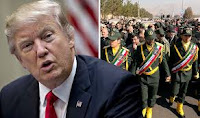On 8th April 2019, the US declared Islamic
Revolutionary Guard Corps (IRGC) of Iran, a Foreign Terrorist Organization. The
IRGC is Iran’s most powerful military and security organization as well as a
key economic player. "This unprecedented step, led by the Department of
State, recognizes the reality that Iran is not only a State Sponsor of
Terrorism, but that the IRGC actively participates in, finances, and promotes
terrorism as a tool of statecraft," said the US President Donald Trump.
The IRGC was created after the 1979 revolution to
enforce Ayatollah Ruhollah Khomeini’s concept of an Islamic state. The Guards
played a crucial role not only in crushing early opposition to Khomeini’s vision,
but also in repelling Saddam Hussein’s invasion of Iran in 1980. Since then,
the Guards have functioned as both the primary internal and external security
force.
This declaration represents the latest escalation of
the US administration’s "maximum pressure" campaign targeting Iran’s
malign activities. The IRGC was already designated under US Treasury
counter-proliferation authorities (EO 13382) in 2007, and then again for human
rights abuses ‑ along with the Basij Resistance Force and the Law Enforcement
Forces ‑ under EO 13553 in 2011.
Iran responded to this action by saying, “The major effect
of this designation is to make it extraordinarily difficult for the US to bring
Iran back into the global community of nations and global financial system at
any point in the future if political circumstances merit such a climb down.” Iranian
officials also do not view this latest development as a precursor to a military
conflict between Iran and the US.
Detaining additional US citizens, testing missiles, or renewing harassment
of US vessels in the Gulf are low-risk options that Iran could pursue in
response to the IRGC designation.
Iran’s Supreme National Security Council (SNSC) responded to
the State Department’s designation of the IRGC by designating the US
government as a state sponsor of terrorism and US Central Command (CENTCOM) and
all its forces as a terrorist organization. President Hassan Rouhani threatened
to restart Iran’s nuclear program in a speech marking the National Day of
Nuclear Technology.
Iranian newspapers spanning the country’s political spectrum
reacted to the US State Department’s designation of the IRGC as a foreign
terrorist organization with a mix of outrage, bombast, and expressions of
solidarity with the IRGC.
International reaction to the IRGC designation has been
mixed. Israeli Prime Minister Benjamin Netanyahu thanked President Donald Trump
for the move in a pair of tweets in English and Hebrew. Iraqi Prime Minister
Adil Abdul-Mahdi said that his country tried to dissuade the US from proceeding
with the designation.






